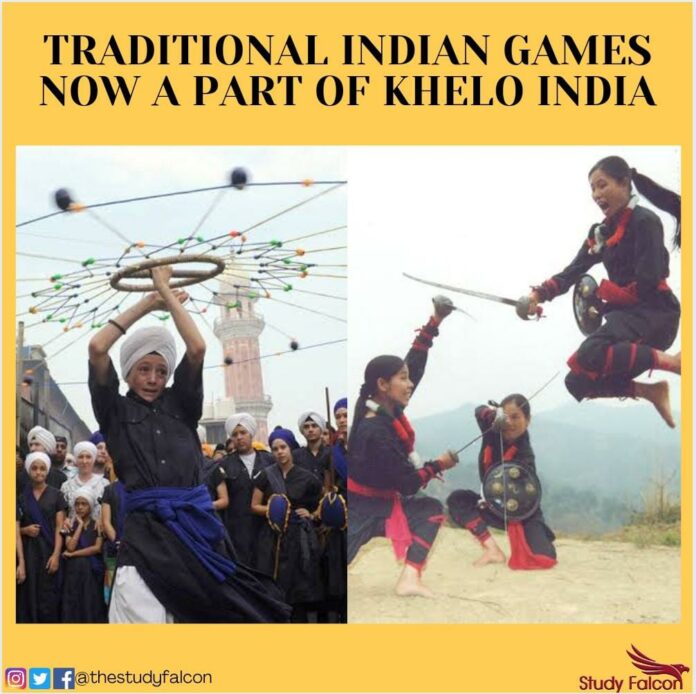The Ministry of Youth Affairs and Sports has recently included Gatka, Kalaripayattu, Thang-Ta and Mallakhamba in Khelo India Youth Games 2021.
The Khelo India Youth Games (KIYG) 2021, are scheduled to take place in Haryana. The 2020 KIYG was held in Guwahati (Assam). KIYG is a part of the revamped national programme for development of sports ‘Khelo India’ which was approved by the Union Cabinet in 2017.
The Khelo India Scheme aims to encourage sports all over the country, thus allowing the population to harness the power of sports through its cross-cutting influence, namely holistic development of children & youth, community development, social integration, gender equality, healthy lifestyle, national pride and economic opportunities related to sports development. Under the Scheme, talented players identified in priority sports disciplines at various levels are provided annual financial assistance of Rs. 5 lakh per annum for 8 years.
Gatka
Gatka originates from the State of Punjab and this traditional fighting style of the Nihang Sikh Warriors is used both as self-defense as well as a sport. It is a style of stick-fighting, with wooden sticks intended to simulate swords Gatka which is believed to have originated when the 6th Sikh Guru Hargobind adopted ‘Kirpan’ for self-defence during the Mughal era. It was earlier confined to gurudwaras, nagar kirtans and akharas, but now it finds presence in the sports category after the formation of the Gatka Federation of India (GFI) in 2008.
The Punjab government had already enlisted the Gatka in its State Sports Policy in 2015. The School Games Federation of India (SGFI) had included the Gatka game in the National School Games calendar in 2015.
Kalaripayattu
Kalaripayattu, also known simply as Kalari, is an Indian martial art that originated in modern-day Kerala.
Kalaripayattu is held in high regard by martial artists due to its long-standing history within Indian martial arts. It is believed to be the oldest surviving martial art in India. It is also considered to be among the oldest martial arts still in existence, with its origin in the martial arts timeline dating back to at least the 3rd century BCE. The place where this martial art is practised is called a ‘Kalari’. It is a Malayalam word that signifies a kind of gymnasium.
Kalari literally means ‘threshing floor’ or ‘battlefield’. The word Kalari first appears in the Tamil Sangam literature to describe both a battlefield and combat arena.
Mallakhamb
Mallakhamb is a traditional sport, originating from the Indian subcontinent, in which a gymnast performs aerial yoga or gymnastic postures and wrestling grips with a vertical stationary or hanging wooden pole, cane, or rope
The name Mallakhamb derives from the terms malla, meaning wrestler, and khamb, which means a pole. Literally meaning “wrestling pole”, the term refers to a traditional training implement used by wrestlers.
Madhya Pradesh and Maharashtra have been the hotspots of this sport.
Competitive Mallakhamb at the national level first made its appearance in 1958 at the National Gymnastics Championships (NGCs) held at the Pahadganj Stadium, Delhi, India. The Gymnastics Federation of India (GFI) proposed to recognize the game and include it in subsequent NGCs. The first National Mallakhamb Championships were held in 1962 at Gwalior, Madhya Pradesh, as part of the NGCs
Thang Ta
Huyen langlon is an Indian martial art from Manipur. In the Meitei language, huyen means war while langlon or langlong can mean net, knowledge or art. Huyen langlon consists of two main components: Thang-ta (armed combat) and Sarit sarak (unarmed fighting).
The primary weapons of huyen langlon are the thang (sword) and ta (spear). Other weapons include the shield and the axe.
This move received great appreciation from various political parties and ministers. Traditional sports have been diminishing, this move will bring these sports into better coverage. Union minister of youth affairs and sports Kiren Rijiju conformed the news through a tweet statin that ‘India has a rich culture of indigenous game’ and that Prime Minister NarendraModi wants to preserve & popularise all of them.










